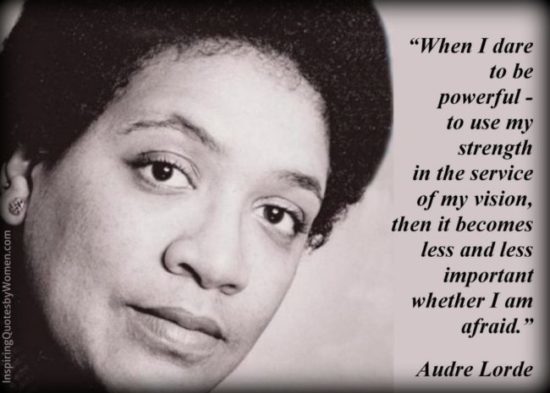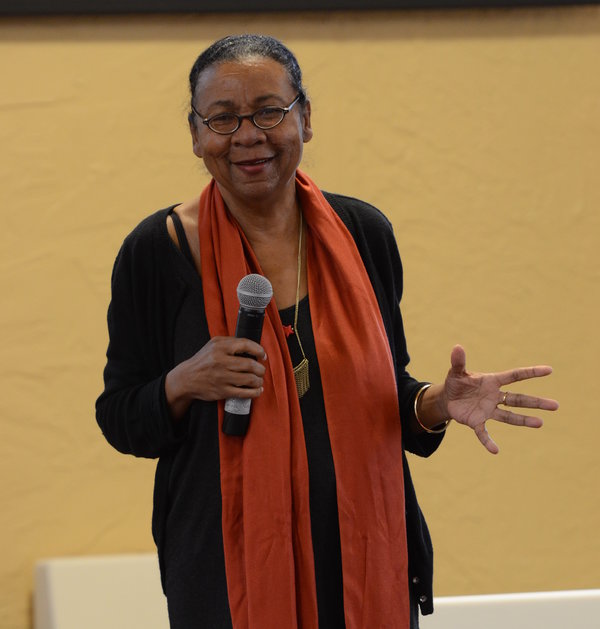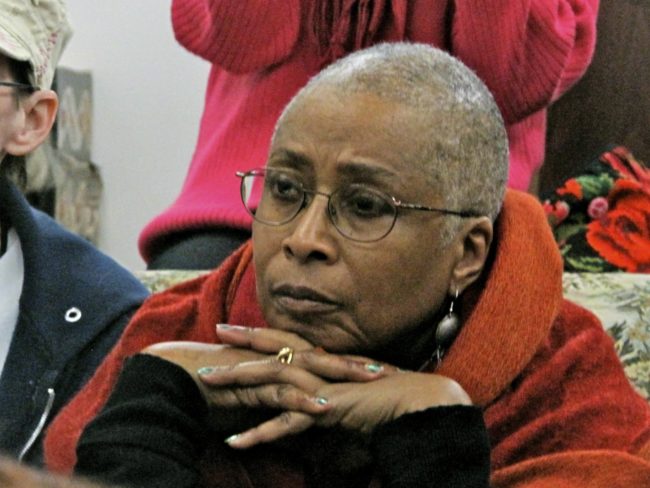For Black History Month I want to honor some of the brilliant African American women writers that have left an indelible mark on me.
I’m particularly indebted to Audre Lorde, bell hooks, Alice Walker, Angela Davis and Lucille Clifton. I read them in the pre-internet era of the ‘80’s and ‘90’s when face-to-face communication was our primary form for exchanging ideas. Friends and I would meet for coffee with our books tucked under our arms, eager to share our latest discoveries.

In the pre-internet era Barnes and Nobles cafe was a popular meeting place for book talk
I enthusiastically sang the praises of Sister Outsider by Audre Lorde, pressing it on practically everyone I knew. I was radicalized by Lorde’s essay, “Uses of the Erotic.”
It was eye-opening to think of the erotic as much more than a sexual response, along with Lorde’s insistance that our culture’s fears of female power works to suppress the erotic in women. (Could this be a factor in the rise of the anti-abortion movement?) For Lorde, the erotic informs everything we do. It’s the passion we bring to our creativity and to the simple acts of daily living.

This passage is dog-eared in my copy of Sister Outsider:
“When we begin to live from within outward, in touch with the power of the erotic within ourselves and allowing that power to inform and illuminate our actions upon the world around us, then we begin to be responsible to ourselves in the deepest sense.”
bell hooks seemed to write a book a year during the ‘90’s, making it hard to keep up with her. I was part of a hooks study group. We spent hours discussing her dense 1994 essay collection Outlaw Culture where hooks calls on black women to “decolonize” their minds, to look at the world as subjects and not objects.

bell hooks delivering a lecture; she died in 2011, leaving a big hole for her many fans
It was a big epiphany to recognize that deconstructing my life as a white woman living under patriarchy, was duck soup compared to the obstacles Black women faced.
hooks references Buddhism as a valuable practice for understanding “the other,” through dispensing of ego. She advocates breaking down barriers between people to advance meaningful social change. In a message that is just as relevant today as it was in 1994, hooks calls on us to turn despair into transformation.
There were occasions in the ‘80’s and ‘90’s when I had the good fortune to be in the electrifying presence of favorite writers like Angela Davis and Alice Walker. It was impossible to leave a Davis speech without feeling pumped to storm the barricades. Her 2016 book, Freedom Is A Constant Struggle, is especially relevant today for activists supporting Palestine.

I met Alice Walker in the early ‘80’s, shortly after she published her blockbuster, The Color Purple. Alice was a guest writer at a women’s writing retreat in upstate New York I attended. She was kind, gentle and generous in her critiques.

Alice Walker, 2016 on the Freedom Flotilla to Gaza
Another black writer/teacher that I will never forget is Luisah Teish, author of Jambalaya, whom I met through a class in Women’s Spirituality. Luisah had a background as a dancer and Yoruba priestess. When she delivered lectures, she didn’t stand behind a lectern, but moved among us, passing along her infectious pulsating energy. Luisah made you believe in yourself and in the power of women’s sacred circles.

More recently I was awakened by Isabel Wilkerson’s ground-breaking book, Caste. (The new film, Origin, by Ava DuVernay is based on Caste.) Wilkerson’s exhaustive research documents how American society has always been defined by a hidden caste system, comparable to India’s caste system. Like the Indian Dalits, African Americans, are socially conditioned from birth to remain in the lower caste.
I’ve been enlarged by some phenomenal black women poets: June Jordan, Rita Dove, Nikki Giovanni and Lucille Clifton. Their beautiful phrasing and depth of feeling never fails to stir me.
Here’s a treasured Rita Dove poem entitled “Fox.” 
She knew what
she was and so
was capable
of anything
anyone
could imagine.
She loved what
she was, there
for the taking,
imagine.
She imagined
nothing
She loved
nothing more
than what she had
which was enough
for her,
which was more
than any man
could handle.






